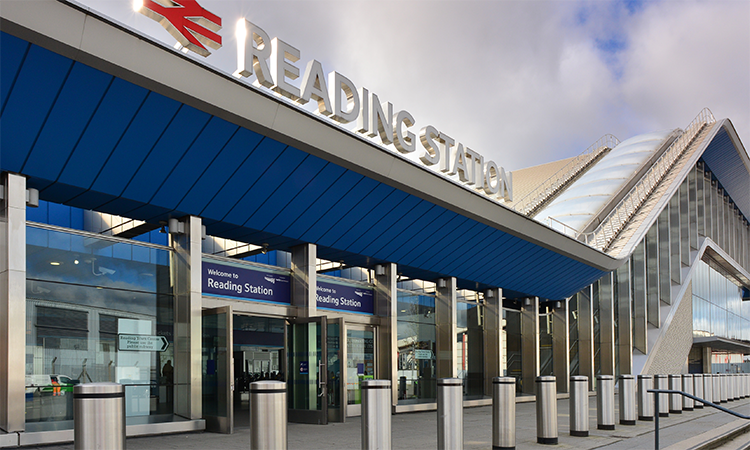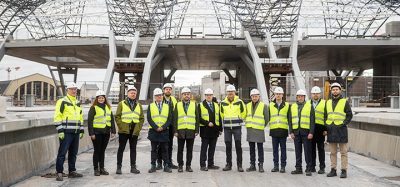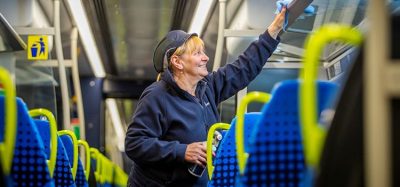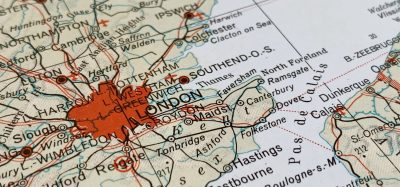Innovative digital twin project underway at Reading station
Posted: 14 June 2022 | Elliot Robinson (Editorial Assistant - Global Railway Review) | No comments yet
Network Rail are developing a digital twin of Reading station to improve its carbon emissions and energy performance by around 20 per cent.


Credit: Network Rail
An innovative project to improve carbon emissions and energy performance at Reading station is underway which has the potential to improve the station’s energy performance by around 20 per cent. Sensors are set to be installed across Reading station to capture live, real-time data on the station’s energy usage in a bid to help cut the station’s carbon emissions and improve its energy performance.
This innovative approach to understanding and improving the station’s energy performance is thanks to a specialist computer modelling platform that has developed a digital twin of the station including a simulation of its current energy usage. Using existing, historical data and modelling, a number of opportunities have been identified that are predicted could result in around a 20 per cent improvement on the station’s carbon emissions and energy performance.
Network Rail has team up with Atkins, a member of the SNC-Lavalin Group, and Cardiff University to develop this digital twin of Reading station, utilising Cardiff University’s Computational Urban Sustainability Platform (CUSP).
Using this data and computer modelling to create baselines for the station’s energy consumption and carbon emissions, CUSP has been used to map out ways of improving the station’s performance via energy efficiency measures whilst exploring further possible changes and the potential impact this could have on making additional energy savings.
A number of ways to reduce energy expenditure and carbon emissions with minimal costs have been identified, including improved lighting controls such as dimming when an area of the station is not in use and turning off machinery such as escalators when they are not in use or overnight when train services aren’t in operation.
In addition to the data being collected by the sensors at the station, passenger numbers and research to understand passenger and station-user behaviour will also be recorded to understand how identified energy savings might impact their safety and experiences when in the station. It is hoped, following the energy and carbon savings being realised at Reading station, this technology can be utilised across the rail network to support Network Rail in its commitment to reducing its carbon footprint.
Content you may also enjoy:
Life-saving intervention milestone achieved on Britain’s rail network
ORR and Network Rail working to improve rail signalling
Network Rail’s RIDC carry out first testing of retrofitted ETCS train
“We’re delighted to be working with Atkins on this innovative project which will help us gain a better understanding of complex assets, such as Reading station, and their predicted performance, allowing us to confidently identify and deliver energy efficiency measures and ultimately manage our assets effectively,” Adam De Benedictis, Regional Energy and Carbon Manager for Network Rail, said. “As an organisation, we are committed to reducing our carbon emissions and playing our part in helping combat global warming while ensuring passengers’ experiences in our stations and on our railways are safe, reliable and comfortable.”
“This is an important milestone as we look to harness data and technology to improve delivery at every stage of an asset’s life,” Nick Tune, Technical and Technology Director at Atkins, said. “Digital twins are the centrepiece of this shift which is giving us the information needed to not only identify opportunities to improve an asset’s energy performance but to interrogate future scenarios, explore further recommendations and tell us how those interventions will work with an unprecedented degree of certainty.”
If you found this article informative and engaging, then we have a special invitation for you. Join us at our upcoming event Digital Rail, where we dive deeper into the topics discussed here, providing a platform for stimulating conversations and networking opportunities. Experience first-hand the excitement of being part of a dynamic rail community passionate about implementing changes and utilising the latest innovations and technologies.
Mark your calendar and be prepared to be inspired. We look forward to welcoming you to an unforgettable event that will leave you with valuable insights and a renewed enthusiasm for the subjects that matter most to you.
Digital Rail
20-21 September 2023
Topics covered include: Digital twins, Cyber-security, Asset maintenance, Rolling stock management, Intelligent infrastructures, Digital signalling, Virtual reality and Passenger information
Related topics
Digital Twins, Digitalisation, High-Speed Rail, Passenger Experience/Satisfaction, Station Developments, Sustainability/Decarbonisation, Technology & Software








